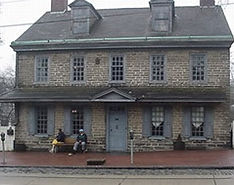
Johnson House in Philadelphia
was built in 1768 by a Quaker
family. In the 1800s it was a
stop on the Underground Railroad
that cared for slaves on their
journey to Canada or another
northern city.

Hidden attics and secret
rooms were added or used
by "stations" on the
Undergrond Railroad.
Like those used to hide the
Jews in Nazi Germany, such
spaces kept fugitives hidden
from nosy neighbors and
the authorities.
In Philadelphia you are approached by an black woman who asks you if you are lost.
You tell her that you are in fact new to the city and are looking for a place to stay.
Recognizing that you both are probably fugitives she takes you to a house owned by a Quaker named Samuel Johnson. Mrs. Johnson brings you hot stew and biscuits and reassures you that you have reached freedom.
"Even though this is Philadelphia, it is not safe to stay here", Mrs. Johnson adds. "We can put you in touch with other well known members of The Society." She is referring of course to the Pennsylvania Anti-Slavery Society.
After a good night's rest you both are given new clothes and falsfied emancipation papers that say that your former master had set you free in his will. You are taken to meet other members of The Society including William Still, a freedmen who had escaped from Maryland more than a decade earlier.
"It's not safe in this city anymore", still tells you. "White people make up 90% of the population and most of them don't care to help the cause of slavery. However, the streets are crawling with pro-slavery forces out to catch a fugitive and collect on the reward." This is a way of saying that you can still trust no one.
Since you are determined to stay in Philadelphia you tell him that you want to find a job and a place to live. There are 15,000 black people in a city of 150,000. A sizeable number. Still tells you of two segregated neighborhoods where black folks live. One is along the Delaware River, the other in a place called Black Bottom.
Still puts you in touch with people who get you a job as a carpenter. Ellen finds work as a domenstic servant in a white household. Even though racism is still common you are elated that you are free to make your own chocies and keep the money you earn. You are amazed to see shops owned by black businessmen. Schools educate black children and are taught by white and black teachers.
You and Ellen finally decide on having children, because the horror of having them stolen from you and sold like cattle is long gone.